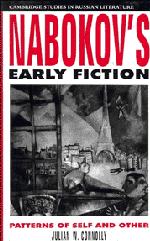Book contents
- Frontmatter
- Contents
- Acknowledgments
- List of abbreviations
- Introduction
- 1 The quest for the other
- 2 Altering the themes of life
- 3 The evil differentiation of shadows
- 4 A fondness for the mask
- 5 Dimming the bliss of Narcissus
- 6 The struggle for autonomy
- 7 The transforming rays of creative consciousness
- Notes
- Bibliography
- Index
- CAMBRIDGE STUDIES IN RUSSIAN LITERATURE
Introduction
Published online by Cambridge University Press: 05 December 2011
- Frontmatter
- Contents
- Acknowledgments
- List of abbreviations
- Introduction
- 1 The quest for the other
- 2 Altering the themes of life
- 3 The evil differentiation of shadows
- 4 A fondness for the mask
- 5 Dimming the bliss of Narcissus
- 6 The struggle for autonomy
- 7 The transforming rays of creative consciousness
- Notes
- Bibliography
- Index
- CAMBRIDGE STUDIES IN RUSSIAN LITERATURE
Summary
Recent years have witnessed a bracing expansion in the critical scope of Nabokov scholarship. Countering the trend which dominated the field in the late 1960s and early 1970s – a quest to decode the author's elaborate verbal puzzles and literary allusions – scholarship in the last decade has delved increasingly into the ethical dimensions of Nabokov's work (see, for example, the studies Nabokov and the Novel by Pifer and The Novels of Vladimir Nabokov by Clancy). Contemporary commentators have taken to heart David Richter's observation that while “we must certainly heed Nabokov's plea not to read his narratives as social sermons, we need not turn him into a mere manufacturer of crossword puzzles and chess problems” (“Narrative Entrapment” 419–20). Critics such as D. Barton Johnson, Pekka Tammi, Brian Boyd, Leona Toker, and Vladimir Alexandrov have produced excellent studies that display a sensitive appreciation for the peerless fusion of technical virtuosity and philosophical inquiry that makes up Nabokov's best work.
The present study aims to delineate Nabokov's growth as a literary artist during the first phase of his career in fiction (1924–39) by focusing on his changing approach to one of the most significant concerns of his art: the relationship between self and other. Nabokov's fiction is renowned for its intricate allusiveness, linguistic play, and elaborate authorial patterning.
- Type
- Chapter
- Information
- Nabokov's Early FictionPatterns of Self and Other, pp. 1 - 9Publisher: Cambridge University PressPrint publication year: 1992



